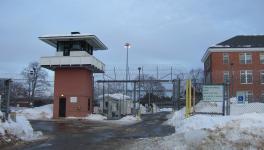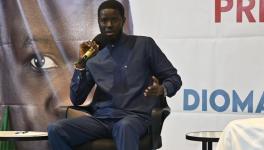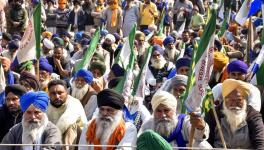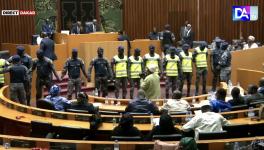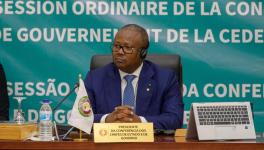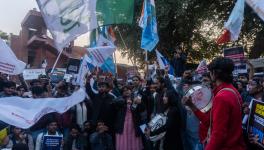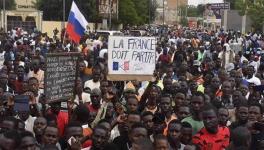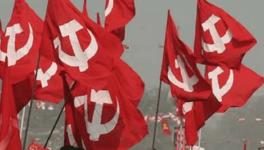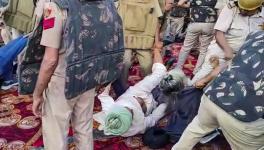Senegal’s Political Crisis Escalates After Repression of Protesters
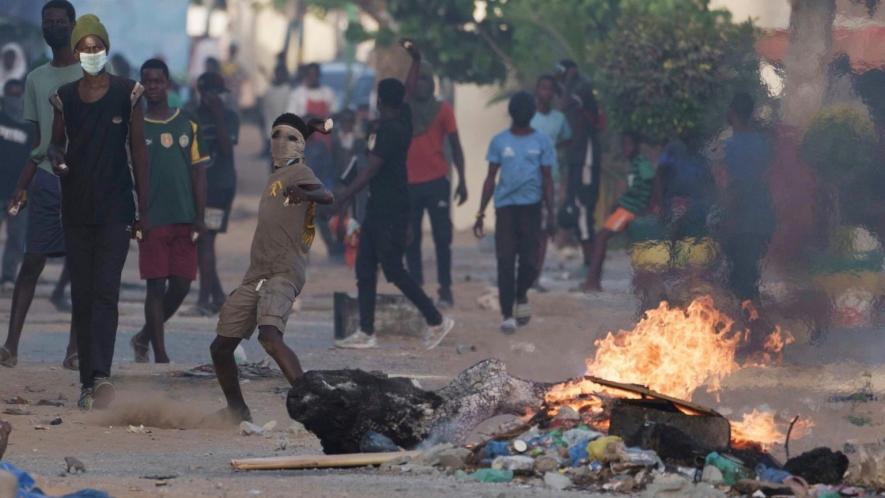
(Photo: @BangweuluTv/Twitter)
Between June 1 and 3, Senegal erupted in protest after a court in the capital Dakar sentenced leading opposition figure Ousmane Sonko to two years in prison.
The 48-year-old leader of the Patriots for Work, Ethics, and Fraternity (PASTEF) party stood accused of charges of rape and issuing deaths threats against a young woman employed at the ‘Sweet Beaute’ massage salon between 2020 and 2021. The court acquitted Sonko of the charges of rape, but convicted and sentenced him instead on the amended charge of ‘corrupting youth’, defined as immoral behavior towards someone under the age of 21.
The “Sweet Beaute case,” as it is known, is at the center of a major political crisis in Senegal—framed in terms of a contest between Sonko and a popularly-rejected, but as yet unconfirmed, bid by President Macky Sall to seek a third term in the 2024 presidential elections.
Sonko did not appear for the proceedings on June 1, having called upon his supporters to launch a campaign of ‘civil disobedience’ against the judiciary. He has been confined to his home in the district of Cité Keur Gorgui after being forcibly detained by police on May 27 while he was leading a ‘Freedom Caravan’ from the city of Zuguinchor, of which he is the mayor, to the capital.
As the verdict was announced, Sonko’s supporters took to the streets in Dakar. Unrest was also reported from Ziguinchor, Mbour, Kaolock, and Saint-Louis. Smoke and tear gas rose in the streets with the military and riot police deployed in the capital city.
By June 2, 16 people were killed, 350 injured and 500 arrested, according to figures released by the Interior Ministry. Other reports placed the death toll over 20. Visuals circulating on social media showed the security forces using people, including a child, as human shields, alongside reports of non-uniformed armed men in the streets in the presence of, and even alongside, the police.
Meanwhile, access to social media platforms such as Twitter and Telegram was restricted and mobile internet connections remained shut down till days later.
Sonko’s lawyer has indicated that the court’s ruling might not be subject to appeal, given that he was sentenced in absentia. While a warrant for his arrest has not been issued yet, the conviction as it stands points to Sonko’s definite disqualification from the 2024 elections.
He was already facing an imminent threat after he was handed a two-month suspended sentence in a libel case involving Tourism Minister Mame Mbaye Niang. The matter is currently pending before the Supreme Court.
Sonko and his supporters have maintained that the criminal trials against him are a political plot devised by Sall to oust him from next year’s ballot. The president has been repeatedly accused of instrumentalizing the justice system to eliminate political rivals—notably the imprisonment and subsequent banning of his two key contenders, Karim Wade and Khalifa Sall, from the 2019 elections.
This and the Sweet Beaute case combined, with indications of interference and manipulation in the course of the investigation, as well as allegations of abuse of power by the president with not only the arrests of members of PASTEF but also of political activists, civil society members and journalists in the preceding months, all worked to fuel mistrust in the judicial process.
A third term for Sall?
The repression of protests between June 1 and 3 was the second major incident of deadly violence since March 2021 when Sonko was arrested while on his way to court, sparking five days of unprecedented countrywide demonstrations in which 14 people were killed in a similarly brutal crackdown.
It was on June 7 that Sall finally addressed the violence of the preceding weekend, however, not in front of the Senegalese people, but only the Council of Ministers. On May 31, the president launched a “national dialogue,” which was boycotted by sections of the opposition including PASTEF.
When asked again if he was considering a third term, Sall reportedly said that the issue could be a part of the dialogue, adding that the outcome of the conclusions of the dialogue should be expected by June 25, following which he would “address the Nation.”
The president’s refusal to confirm his potential third bid has continued to fuel speculations and public frustration. The question hinges on a constitutional reform approved in 2016 which shortened the presidential term from seven to five years, and put in place a two-term limit on the presidency.
Speaking to French magazine L’Express in March, Sall stated that prior to the referendum, he had consulted the Constitutional Council, which said that his first term would be beyond the scope of the reform, and would be disregarded. “The legal question is therefore settled. Now should I run for a third term or not? That is a political debate.”
According to news reports, a new proposal has been added to the ongoing debate on this matter: Sall would be willing to give up a third term on the condition that his present term be extended till 2026 to “restore order in the country.”
Any such maneuvering, coupled with Sonko’s looming imprisonment, is likely to spark further protests in Senegal, where just over a decade ago, mass mobilizations in the form of the Y’en a Marre or ‘Enough is Enough’ movement broke out against an attempt by former president Abdoulaye Wade to seek a third term. The ensuing elections brought Macky Sall to power.
France Dégage, Macky Dégage
In a context where successive governments have been mired in corruption and nepotism, Sonko has firmly positioned himself outside this “system,” outlining a different vision for the masses in Senegal.
A former chief tax inspector, Sonko rose to prominence for speaking up about government corruption and irregularities in public sector contracts, which ultimately led to his dismissal. Having founded PASTEF in 2014, Sonko entered parliament in 2017, and subsequently contested the 2019 presidential race, coming in third with 16% of the vote.
While Senegal has recorded high levels of economic growth under Sall, this has not translated into an improvement in the living conditions of the people. Nearly 40% of the people live in poverty while facing unemployment and rising costs of living.
Sonko has spoken directly to these issues of poverty and hunger, tying the wealth of politicians to the embezzlement of public funds, and of the enrichment of foreign capital at the cost of the national economy.
While Sall has had close ties with France, Sonko has taken aim at the the CFA Franc — the central tool through which Paris continues to maintain control over its former colonies and undermines a sovereign monetary and developmental agenda. He has called for an exit from the neo-colonial currency system.
This has reflected mass sentiment in Senegal, where protests have not only expressed anger at the ruling political class, but have also explicitly rejected the neo-colonial extraction as it is experienced in everyday life— be it buying groceries from a French supermarket at the expense of local producers, or paying toll fees to a French company.
So, while protestors have burned the French flag, they have also attacked and looted several French-owned businesses, particularly the Auchan supermarkets, gas stations operated by Total, and facilities of telecommunications operator Orange (which also owns a 42.3% controlling stake in Senegal’s telecommunication company, Sonatel).
Similar attacks were reported during June 1 and 3, with Auchan suspending its operations in Mbour.
“There are two political projects fighting against each other, you have the older, neo-colonial political project that is epitomized by Macky Sall and then an aspired liberation project epitomized by Ousmane Sonko,” Senegalese economist and writer, Ndongo Samba Sylla, told Peoples Dispatch.
“People want change, but change has been difficult in Francophone Africa because the legacy of French colonialism has been one where all progressive leaders, be they nationalist, communist, or revolutionary, did not stay in power for long because every time, France, through its local allies, managed to remove them,” he added. History is rife with examples— the coup against Thomas Sankara in Burkina Faso in 1987, Sylvanus Olympio in Togo in 1963, and Modibo Keita in Mali in 1968.
A splintering opposition, a presidentialist system, and the popular will
“In Senegal, no political party can conquer power by itself. So the dominant political party in the opposition has to be in alliance with other members of the opposition…the names they give themselves do not matter because they do not apply, most politicians just run for power, they never discuss ideas and their main goal is to conquer power for the sake of power,” Sylla said.
In the 2019 elections, the Yewwi Askan Wi (Liberate the People) coalition led by Sonko formed an alliance with the Wallu Senegal (Save Senegal) coalition led by former president Abdoulaye Wade. The move led to Sall’s party losing its majority in parliament, a first in Senegalese history. Municipal polls held in January that year also saw the opposition make significant advances, with Sonko assuming mayorship of Zuguinchor.
However, this alliance soon began to fracture — first with Abdoulaye Wade and then with Khalifa Sall, Sylla explained, with both leaders agreeing to take part in Sall’s “national dialogue”. This is as much a result of a lack of ideological and political unity in the opposition as it is the very nature of the Senegalese state, where power is concentrated in the presidency.
Not only is Senegal under a presidentialist system, but the current administration has also run the country through “an entanglement of business, family relations, personal privilege, and nepotism,” said Dr. Rama Salla Dieng, a lecturer in African Studies and International Development at the University of Edinburgh.
“The use of political violence to eliminate opponents has been a constant element…When we describe what democracy is we speak of rule of law and the separation of power, this is not something we have in Senegal. The president has a say in who gets elected to the judiciary…the parliament,” she added.
Moreover, violence has served as just one of the means through which the ruling administration has “kept the popular will in check,” the other being the exclusion of young people from the formal electoral process.
According to Sylla, more than 56% of potential voters, that is people between the ages of 18 to 30 years, are not registered to vote. “In April and May of 2022, it was announced that the electoral list would be revised, so people had about three weeks to register. But this period was not sufficient because the offices in charge of voter registration could only process about 300 requests per day, at best.”
“So by the end the voting status, including new registrations, of only about 300,000 people had changed, out of a potential 2.5 million voters.” he said, based on his calculations.
For Sylla, this speaks to a broader crisis of the system of liberal democracy, “which is not made to promote goals that are legitimate and for the people.”
“We do not have leaders who could transform our countries, and those who offer hope face many hurdles… but these hurdles are superficial. For now, the faces that you see are the tip of the iceberg, because those who control the Senegalese economy are not visible.”
“The current conception of democracy that we have is a democracy based on economic violence [emphasis added]. As long as we have the rituals of organizing elections every five years, free press, it is all said to be fine. This ‘fine’ is while people are suffering, they have no jobs, they live in income insecurity… and they [those in power] pretend this is democracy.”
The ‘Senegalese exception’ and a crisis of imagination
Much of the international reporting on the current situation in Senegal laments its loss of stature as a “beacon of stability and democracy” in West Africa. This ‘Senegalese exception’ is invoked in reference to the peaceful transitions of formal political power through the ballot box, in a region which had otherwise seen a wave of coups in the post-independence period.
“This led French political scientists to theorize the ‘Senegalese exception,’” Dr. Rama Salla Dieng told Peoples Dispatch.
In reality, “this [exception] was based on a fragile consensus between the state and the religious leaders (or the Marabouts) —even now, Macky Sall has not spoken to his counterparts or the people that elected him, but he went to the city of Touba to visit these leaders…But this ‘exception’ was also the result of a consensus with economic partners and the civil society.”
The concept of the “Senegalese exception” also does not adequately account for the fact that moments of political transitions have been preceded by popular unrest— by the Senegalese people taking to the streets to have their demands heard. “On what basis do we talk about Senegalese exception?” Dieng asked.
The juncture at which the country stands now is a highly polarized one, with a politicized case whose implications were pre-determined. “It is a deadly fight…and this battle is being fought on the bodies of women and the youth,” Dieng said. “What has become of the investigations into the deaths of the 14 young men who were killed in 2021? Nothing.”
Meanwhile, It was only in 2020 that rape was criminalized in Senegal, a product of feminist struggles dating back to the 1970s. “What we have seen in the past two years is a systematic requalification of any case of rape involving a high profile politician.” Dieng said, pointing to the acquittal of Sall’s ally, and former mayor of Fatick, Sitor Ndour, in the rape of a young domestic worker.
Senegalese feminists have also spoken out strongly in the current context. “There is going to be backlash,” Dieng warned, not just in terms of feminist organizing and issues of sexual violence, but also a shrinking of public spaces for citizens to gather and demonstrate.
“What we are seeing right now is a regime that knows it will not survive and is trying to take anyone else that it can take down with them. So shameful of Macky Sall when we know how to come to power, he risks going down for the very reason that he fought for when he was elected.”
For Dieng, the current situation is also a result of the “abolition of political imagination,” which has resulted in a deeply divided and limited political discourse.
“For me it is very symbolic—the first time the protests happened in 2021 the protesters attacked Auchan and other French-owned stores…these representations of capitalist interests and of neocolonialism. This time, the first place that was attacked was the university in Dakar, which has always been a place of tension and protest but people never targeted it, to burn it or demolish it.”
For Dieng, this conveys the deprivation and disillusionment faced by young people in Senegal, where a popular culture of “hustling” has emerged as a way to lift oneself out of poverty in the absence of access to economic opportunities, leading to a lack of trust in the route of formal education as a path to upward mobility.
So, what does it take to move forward? “It depends on Macky Sall to go out and apologize to the Senegalese people and declare that he will not run for a third term…Beyond that, it takes the capacity to dream again…to win together again…to heal and to reimagine democracy and what it means for us.”
Get the latest reports & analysis with people's perspective on Protests, movements & deep analytical videos, discussions of the current affairs in your Telegram app. Subscribe to NewsClick's Telegram channel & get Real-Time updates on stories, as they get published on our website.










